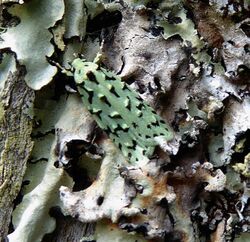Biology:Izatha peroneanella
| Izatha peroneanella | |
|---|---|

| |
| Scientific classification | |
| Domain: | Eukaryota |
| Kingdom: | Animalia |
| Phylum: | Arthropoda |
| Class: | Insecta |
| Order: | Lepidoptera |
| Family: | Oecophoridae |
| Genus: | Izatha |
| Species: | I. peroneanella
|
| Binomial name | |
| Izatha peroneanella (Walker, 1864)
| |
| Synonyms | |
| |
Izatha peroneanella, also known as the small lichen moth or the green lichen tuft, is a moth of the family Oecophoridae. It is endemic to New Zealand, where it is found throughout the North Island, other than the Aupouri Peninsula of Northland.
Description
The wingspan is 15–24.5 mm for males and 17–29.5 mm for females. This moth has pale green forewings with patches of raised black scales that camouflage it well when it rests on lichens.[1] The colouration of this moth is variable with the pale green forewings sometimes being white while in another form the black tufts are coloured brown.[1][2]
Distribution
This species is endemic to New Zealand.[3] It is found in the North Island with the exception of the Aupouri Peninsula.
Biology and behaviour
Larvae of this species grow to approximately 16mm long and pupate in early November within its tunnel.[1] There is one generation per year.[1] Adults are on wing from September to early April. They are attracted to light.[2]
Habitat and host species
This species is commonly found near native forest.[1]
Larvae have been recorded feeding on the dead wood of a variety of angiosperm species. They bore tunnels into the wood.[1] The larvae usually prefer standing dead trees rather than wood found on the forest floor.[1] Larvae have been reared from Alseuosmia species, Carpodetus serratus, Coprosma grandifolia, Coriaria arborea, Fuchsia excorticata, Nestegis species, Pseudopanax arboreus, Ripogonum scandens, Sophora species and Wisteria species.[4]
References
- ↑ 1.0 1.1 1.2 1.3 1.4 1.5 1.6 Early, John (2009). Know your New Zealand-- native insects & spiders. Auckland, N.Z.: New Holland. pp. 150. ISBN 978-1869662530.
- ↑ 2.0 2.1 Hoare, R. J. B. (2010). "Izatha (Insecta: Lepidoptera: Gelechioidea: Oecophoridae)". Fauna of New Zealand 65: 1–201. ISBN 978-0-478-34725-8. https://www.landcareresearch.co.nz/__data/assets/pdf_file/0007/26296/FNZ65Izathaweb.pdf. Retrieved 2018-06-18.
- ↑ "Izatha peroneanella (Walker, 1864)". Landcare Research New Zealand Ltd. http://www.nzor.org.nz/names/fa7f0a2f-1e2b-4776-b976-658af6ebacb0.
- ↑ "PlantSynz - Invertebrate herbivore biodiversity assessment tool: Database". https://plant-synz.landcareresearch.co.nz/ReportForm.aspx?RecordId=1272&Type=H&ReportType=Adv&SortBy=Alpha&Biostatus=a,c,e,n.
Wikidata ☰ Q10766962 entry
 |

